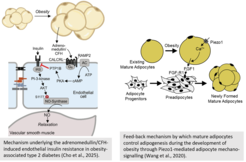Metabolic signaling in obesity and diabetes
Project leaders: Dr. Remy Bonnavion, Dr. Haaglim Cho
PhD students: Chien-Cheng Lai, Xinyi Chen

Metabolic disorders, such as obesity and type-2 diabetes, are risk factors for various diseases including cancer and cardiovascular disorders, and the number of obese and diabetic patients is dramatically increasing worldwide.
In the past, we have identified new regulatory mechanisms of adipocyte turnover and adipocyte function through autocrine regulatory loops (Ahmed et al., 2010) and by inflammatory signaling pathways that regulate adipocyte survival and browning (Sassmann et al., 2016). We have also identified positive and negative modulators of glucose-stimulated insulin secretion (Tang et al., 2015; Tunaru et al., 2018) and have analyzed the mechanism mediating obesogenic adipogenesis (Wang et al., 2020a) and adipocyte survival during obesity (Wang et al., 2020b).
More recent work described a new role of the endothelial insulin receptor in insulin action and its inhibition by endothelial adrenomedullin signalling as a central mechanism of obesity-induced diabetes (Cho et al., 2025).
Future work will focus on the regulation of adipocyte and β-cell turnover and function in healthy and disease states as well as on understanding how metabolic disorders such as obesity promote cancer progression and cardiovascular disorders.
Literature
- Cho H, Lai CC, Bonnavion R, Alnouri MW, Wang S, Roquid KA, Kawase H, Campos D, Chen M, Weinstein LS, Martínez A, Looso M, Sanda M, Offermanns S. (2025) Endothelial insulin resistance induced by adrenomedullin mediates obesity-associated diabetes. Science 387: 674-682.
- Wang L, Wang S, Shi Y, Li R, Günther S, Yuan Z, Liu E, Offermanns S (2020b) YAP and TAZ protect against white adipocyte cell death during obesity. Nat Commun. 11: 5455.
- Wang S, Cao S, Arhatte M, Li D, Shi Y, Kurz S, Hu J, Wang L, Shao J, Atzberger A, Wang Z, Wang C, Zang W, Fleming I, Wettschureck N, Honoré E, Offermanns S. (2020a) Adipocyte Piezo1 mediates obesogenic adipogenesis through the FGF1/FGFR1 signaling pathway in mice. Nat Commun. 11: 2303.
- Tunaru S, Bonnavion R, Brandenburger I, Thomas D, Scholich K, Offermanns S. (2018) 20-HETE promotes glucose-stimulated insulin secretion in an autocrine manner through FFAR1 (GPR40). Nat. Commun. 9: 177
- Sassmann-Schweda A, Singh P, Tang C, Wietelmann A, Wettschureck N, Offermanns S. (2016) Increased apoptosis and browning of TAK1-deficient adipocytes protects against obesity. JCI Insight 1: e81175.
- Tang C, Ahmed K, Gille A, Lu S, Gröne HJ, Tunaru S, Offermanns S. (2015). Loss of FFA2 and FFA3 increases insulin secretion and improves glucose tolerance in type 2 diabetes. Nat. Med. 21: 173-177.
- Ahmed K, Tunaru S, Tang C, Müller M, Gille A, Sassmann A, Hanson J, Offermanns S. (2010) An autocrine lactate loop mediates insulin-dependent inhibition of lipolysis through GPR81. Cell Metab. 11: 311-319.
